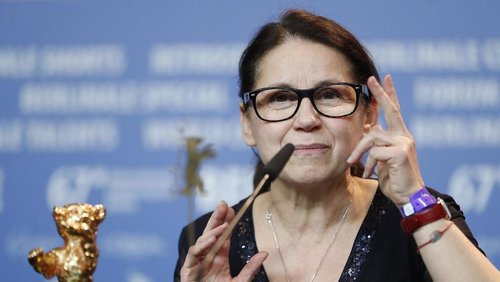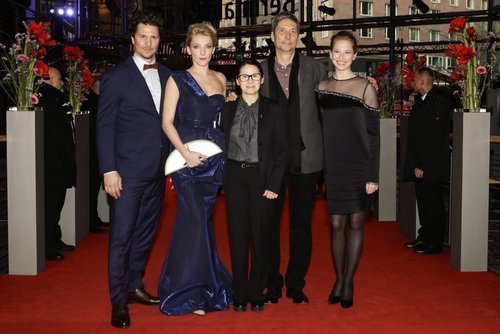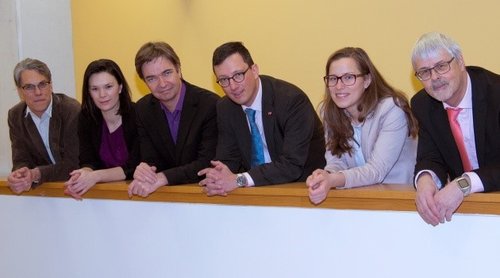A Hungarian love story called "On Body and Soul" about two lonely hearts working in a slaughterhouse in Budapest won the Golden Bear for best film on Saturday (February 18) at the 67th Berlin International Film Festival. It also won the Prize of the Ecumenical Jury, in addition to the Prize of the International Film Critics Association Fipresci.
"This film is approachable only with a generous heart," director Ildiko Enyedi told the audience at the awards ceremony ending the 10-day Berlinale, which showcased 18 films in competition and 403 in sidebar screens.

Born in Budapest, Hungary in 1955, Ildikó Enyedi began her career as a concept and media artist before turning to short and feature films as a writer and director. She has received more than 40 international awards for her work. Her film My 20th Century was chosen as one of the best 12 Hungarian films of all time. In 1992 she was a member of the Berlinale’s International Jury. She teaches masterclasses in film at the University of Theatre and Film Arts, Budapest. She is a founding member of the European Cross Media Academy and a member of the European Film Academy.
The plot, which tells an unusual love story set in the everyday world, is based around the duality of sleeping and waking, mind and matter. "What would happen if you met someone who dreamt the same as you or, to be more precise, had been meeting you in the same world every night for years? Would you be pleased? Or would you feel that you had been in some way robbed? And what if this specific individual didn’t exactly appeal to you? What if you actually hated that person?"

Actors and Director at Berlinale: Nagy Ervin, Borbély Alexandra, Enyedi Ildikó, Morcsányi Géza, Tenki Réka
“Many of us struggle with some kind of disability – whether physical or mental. On Body and Soul is a touching and twisted love story set in a slaughterhouse. The souls of the main characters seem to be connected but they struggle to come close physically. Ildikó Enyedi creates a tender visual story, activating our senses, while raising questions about our connection to each other. The film shows ways we can overcome our incomplete natures and connect with other physical beings.” – reads on the website International Interchurch Film Organisation “Interfilm”, coordinating the Ecumenical Juries at international festivals.

The members of the Ecumenical Jury, from left: S. Brent Rodrigues-Plate, Annette Gjerde Hansen, Jury President Charles Martig, Markus Leniger, Zsuszanna Bányai and Herrmann Kocher (Photo: ©Ekko von Schwichow)
In the Forum, the Ecumenical Jury gave its Prize to "Madame Colonnel" by Dieudo Hamadi, in the Panorama it awarded "Investigating Paradise" by Merzak Allouache. Commendations went to "A Fantastic Woman" by Sebastián Lelio (Competition), to "I Am Not Your Negro" by Raoul Peck (Panorama), and to "El mar la mar" by Joshua Bonnetta and J.P. Sniadecki (Forum).
INTERFILM is the international network for the dialogue between church and film. It promotes the appreciation of cinema’s artistic, spiritual and social significance in the church and calls attention to the relevance of church, theology and religion for cinema. INTERFILM is looking beyond the screen. INTERFILM acts in an ecumenical context. As film constitutes a global form of expression and communication, so INTERFILM is committed to ecumenism: a mutual understanding beyond the limits of confessions, churches and religions. INTERFILM joins church and cinema, cultures and religions. Besides Berlin, Cannes, and Venice, INTERFILM is represented at numerous other festivals such as Karlovy Vary, Locarno, Montreal, or Yerevan.
Church film juries award prizes to films which are of high artistic quality, lend expression to a human viewpoint corresponding with the message of the Scripture, or stimulates debate with the Biblical tradition, and make audiences sensitive to spiritual, social and ethic values.
Award Presentation of the Independent Juries, including the Ecumenical Jury: www.berlinale.de
Ecumenical Office
via www.berlinale.de; www.inter-film.org; www.cineuropa.org
Photos: Ekko von Schwichow, Ian Langsdon, MTI/AP/Markus Schreiber